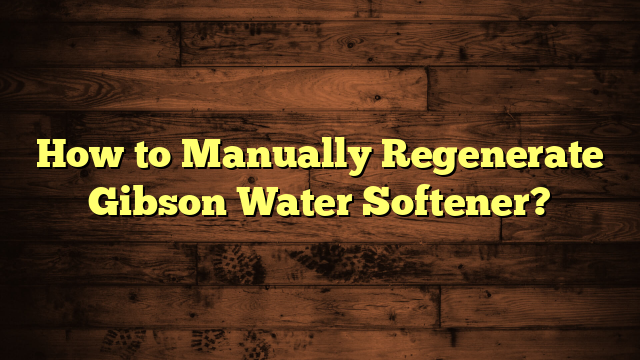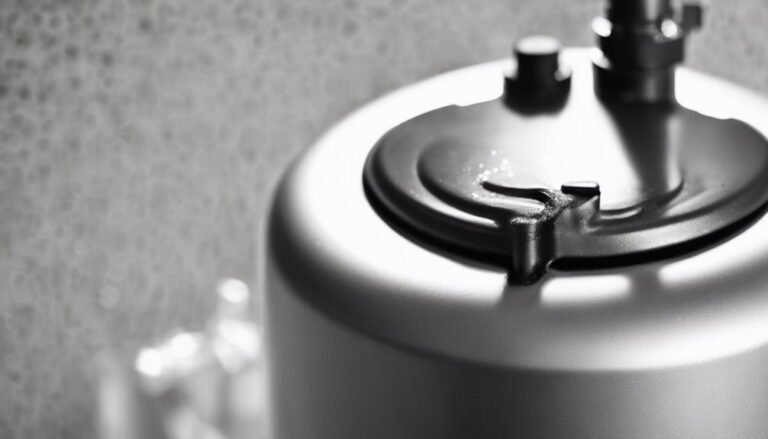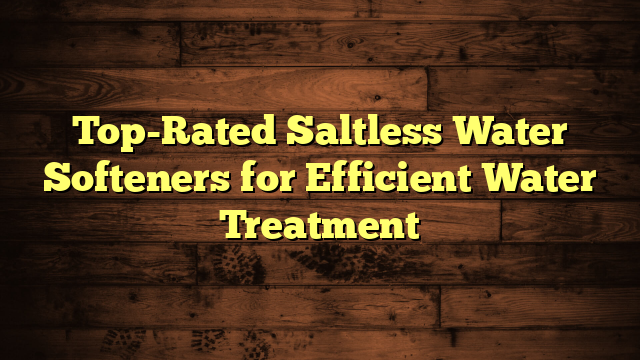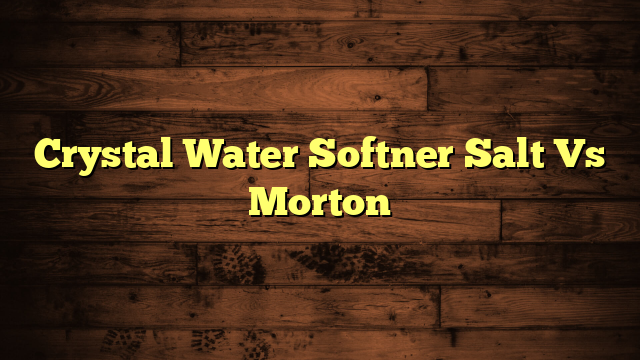How Do I Determine What Size Water Softner I Need?
Did you know that nearly 85% of U.S. households have hard water, which can lead to various plumbing and appliance issues? To avoid these problems, figuring out the right size water softener for your home is essential. Start by evaluating your daily water usage and water hardness levels, but there's more to take into account than just those numbers. Understanding the nuances of different water softener types and their capacities can greatly impact your decision. What factors should you weigh in to guarantee you choose the most effective solution for your needs?
Key Takeaways
- Test your water hardness level in grains per gallon or parts per million to understand the scale of treatment needed.
- Calculate your household's daily water usage by multiplying the average of 80-100 gallons per person by the number of residents.
- Choose a water softener with a grain capacity that matches or exceeds your household's hardness and water usage requirements.
- Consider the type of water softener that best fits your needs, such as salt-based, salt-free, or dual tank systems.
- Ensure the installation area has proper ventilation and access to water lines, accommodating the size of the chosen unit.
Understanding Water Hardness
Understanding water hardness is essential for choosing the right water softener. Water hardness primarily comes from minerals like calcium and magnesium. These minerals can lead to various water mineralization effects, such as scale buildup in pipes, reduced soap effectiveness, and even dry skin.
To address these issues, you need to determine your water's hardness level. You can use several hardness testing methods to assess your water quality. Simple test kits are available at local hardware stores, allowing you to take a sample at home. Alternatively, you might prefer a professional water test, which can provide more thorough results.
Once you know your water hardness level—measured in grains per gallon or parts per million—you can select a softener that meets your needs. In many cases, softer water improves the efficiency of your appliances and enhances the quality of your household tasks, from washing dishes to doing laundry.
Daily Water Usage Calculation
Once you've assessed your water hardness, the next step is calculating your daily water usage. This calculation is vital to guarantee you choose a water softener that meets your needs.
Start by identifying all the sources of water usage in your household, such as showers, laundry, dishwashing, and drinking. You can use different calculation methods, like tracking your water meter for a week or estimating based on average figures.
For instance, the average person uses about 80 to 100 gallons of water daily. Multiply that number by the number of people in your household to get a rough estimate.
If you prefer a more precise calculation, consider adding up the specific gallons used for each activity—for example, a shower typically uses about 17 gallons, while a washing machine may use around 40 gallons per load.
Once you've gathered this information, you can confidently determine your daily water usage. This number is vital when choosing the right size water softener, guaranteeing it effectively meets your household's demands.
Consider Household Size
When choosing the right size water softener, it's crucial to take into account your household size. The number of people living in your home directly impacts your family consumption of water. Larger families typically use more water, which means you'll need a more powerful softener to keep up with demand.
To get a clearer picture, consider the average daily water usage per person, which is usually around 80 to 100 gallons. Multiply this by the number of people in your household to estimate your total daily consumption. For instance, a family of four might use between 320 to 400 gallons daily.
Once you have that figure, you can better assess the softener's capacity you'll need. Softener sizes are often rated by the number of grains they can handle, which correlates to how much hardness they can remove.
Evaluating Water Softener Ratings
When you're evaluating water softener ratings, understanding grain capacity and analyzing water hardness levels are essential.
Grain capacity tells you how much hardness the system can handle, while knowing your water's hardness helps you choose the right size.
Together, these factors guarantee you get a water softener that meets your household's needs effectively.
Understanding Grain Capacity
Understanding grain capacity is essential for choosing the right water softener for your home. Grain capacity refers to the amount of hardness minerals a water softener can remove before it needs to regenerate. This measurement is significant because it directly impacts the efficiency of your water treatment system.
Each softener has a specific grain capacity, typically ranging from 20,000 to 80,000 grains or more, depending on the unit size.
When selecting a water softener, consider your household's water usage and hardness levels. A higher grain capacity means the unit can handle more hardness minerals, making it suitable for larger families or homes with high water demands.
Conversely, if you live alone or have low water usage, a smaller unit may suffice.
Analyzing Water Hardness Levels
To effectively choose a water softener, you'll need to analyze the hardness levels of your water supply. Start by conducting water testing, which will help you determine how hard your water is. You can purchase a testing kit or hire a professional for accurate results.
Once you have your water sample, check the hardness scale, which measures the concentration of calcium and magnesium in grains per gallon (gpg). Water with 1-3 gpg is considered soft, while anything above 10.5 gpg is categorized as very hard. Knowing where your water falls on this scale is essential, as it directly influences the size and capacity of the softener you'll need.
After identifying your hardness level, consider how much water your household uses daily. Combine this information with the hardness rating to calculate the required grain capacity for your softener.
This guarantees that you select a unit that can effectively reduce hardness while meeting your household's needs. By taking these steps, you can confidently choose the right water softener, improving your water quality and extending the life of your plumbing and appliances.
Types of Water Softeners
When it comes to choosing a water softener, you've got a few main options to contemplate.
Salt-based water softeners, salt-free alternatives, and dual tank systems each have unique benefits that can fit different needs and preferences.
Understanding these types will help you make an informed decision for your home's water treatment.
Salt-Based Water Softeners
Salt-based water softeners are the most common type used in households, effectively reducing hard water minerals like calcium and magnesium. These systems typically use a brine solution made from various salt types to recharge the resin beads that remove hardness from the water. Understanding the components and processes can help you choose the right system for your needs.
Here's a quick comparison of common salt types used in water softeners:
| Salt Type | Pros | Cons |
|---|---|---|
| Rock Salt | Cost-effective | May contain impurities |
| Solar Salt | High purity | Higher cost |
| Evaporated Salt | Very high purity | Most expensive |
When selecting a salt-based water softener, consider your water's hardness, the size of your household, and the type of salt you'll use. The right choice will guarantee efficient softening, prolonging the life of your appliances and improving water quality. With proper maintenance and the right salt type, you'll enjoy softer water without the hassle of hard water issues.
Salt-Free Water Softeners
Salt-free water softeners offer an alternative solution for those looking to reduce hard water issues without the use of salt. These systems use a different technology, like template-assisted crystallization, to transform hard minerals into a form that doesn't stick to surfaces.
One of the significant salt-free benefits is that they won't add sodium to your water, making them a better option for those on low-sodium diets.
When considering installation, keep in mind that salt-free systems typically require less maintenance and don't necessitate a drain, unlike traditional salt-based units.
However, they may not be as effective in extremely hard water areas. You'll want to evaluate your specific water hardness and household needs before deciding.
In addition, while salt-free systems can help with scale prevention, they don't soften water in the same way traditional systems do, meaning you might still want to explore combining options for the best results.
Ultimately, choosing a salt-free water softener can be a convenient and health-conscious decision, but it requires careful consideration of your unique water quality and installation requirements.
Dual Tank Softeners
Dual tank water softeners are designed to provide a continuous supply of softened water, making them an excellent choice for larger households or those with high water usage.
Unlike single tank systems, dual tank units can regenerate while still providing water, ensuring that you won't run out even during peak usage times.
Here are some key dual tank benefits you should consider:
- Continuous Softened Water: You'll never have to wait for the system to recharge.
- Increased Efficiency: Dual tank efficiency means less downtime and more consistent performance.
- Longer Equipment Life: Reduced strain on the system can lead to fewer repairs and a longer lifespan.
- Improved Water Quality: With constant access to softened water, you'll notice better tasting and cleaner water for your home.
If you have a busy household or frequently use water for multiple tasks, investing in a dual tank water softener could be a smart move.
With the right system, you can enjoy all the benefits of softened water without interruptions, making your daily routines smoother and more efficient.
Efficiency and Regeneration Rates
When considering how well a water softener performs, efficiency and regeneration rates play essential roles.
Regeneration efficiency refers to how effectively a softener uses salt to remove hardness minerals from the water. The higher the regeneration efficiency, the less salt you'll need, which can save you money and reduce environmental impact.
You should also pay attention to the regeneration rate, which indicates how quickly the system can recharge and get back to work. If your household uses a lot of water, a softener with a higher regeneration rate will be necessary to guarantee you don't run out of softened water during peak usage times.
So, how do these factors affect your choice? A softener with both high regeneration efficiency and a solid regeneration rate assures superior softener performance.
This means you'll enjoy consistently softened water without constantly needing to refill the salt tank.
Take your time to compare models and their specifications. Finding the right balance between efficiency and regeneration will lead you to the best water softener for your needs, making your investment worthwhile.
Installation Space Requirements
Before purchasing a water softener, it's vital to assess the installation space requirements to guarantee a proper fit in your home. Understanding these installation considerations can save you time and hassle later.
Here's a quick checklist to help you with space optimization:
- Dimensions: Measure the area where you plan to install the softener, making sure there's enough room for both the unit and any necessary plumbing adjustments.
- Access to Utilities: Confirm the installation site has easy access to water lines and electrical outlets. This will make the installation process smoother.
- Ventilation: Adequate ventilation is important, especially if your softener requires a brine tank. Make sure the area can support this need.
- Clearance Space: Check for any manufacturer-recommended clearance around the unit for maintenance and service. This can be vital for effective operation and longevity.
Maintenance and Longevity Factors
Proper installation is just the beginning; maintaining your water softener is key to guaranteeing it operates effectively over time. Regular maintenance not only extends the lifespan of your unit but also confirms that you're achieving ideal water quality.
Start by checking the salt levels in your brine tank; keeping it filled with the right type of salt is essential. If the salt level drops too low, the softener won't function properly.
Another important maintenance tip is to clean the resin tank every few years. This helps remove any buildup that could affect performance.
Furthermore, inspect the unit for any leaks or damage, as early detection can prevent larger issues down the road.
You should also consider scheduling routine professional check-ups. Experts can assess the system's efficiency and make adjustments as needed.
Lastly, pay attention to the water quality you receive; if you notice changes, it might signal that your softener needs attention.
Frequently Asked Questions
How Can I Test My Water Hardness at Home?
To test your water hardness at home, you can use testing strips or a DIY soap test. Both methods provide quick insights into your water hardness, helping you understand if softening is necessary.
What Are the Signs I Need a Water Softener?
If you notice soap scum, dull dishes, or dry skin, you might need a water softener. These signs often indicate high water hardness, and a softener can provide benefits like cleaner dishes and softer skin.
Can I Install a Water Softener Myself?
Sure, you can install a water softener yourself, but why not embrace the DIY challenge? Just imagine all the softener benefits you'll enjoy while feeling like a plumbing pro. You've got this!
How Does Water Softening Affect My Plumbing?
Water softening can greatly improve your plumbing maintenance by reducing pipe corrosion. You'll notice longer-lasting pipes and fewer clogs, leading to a more efficient plumbing system. It's a smart investment for your home's water quality.
Are There Alternatives to Traditional Water Softeners?
Yes, there are alternatives to traditional water softeners. You could consider salt-free systems, which condition water without salt, or magnetic softeners, which claim to alter mineral behavior. Each has its benefits, so evaluate based on your needs.
Conclusion
In the quest for the right water softener, think of it as choosing the perfect pair of shoes—comfort and fit are key. By understanding your household's water usage and hardness levels, you can confidently select a unit that meets your needs. Remember, the right size not only enhances your water quality but also extends the life of your appliances. So, roll up your sleeves, gather your data, and step into a world of softer water that's just right for you!







